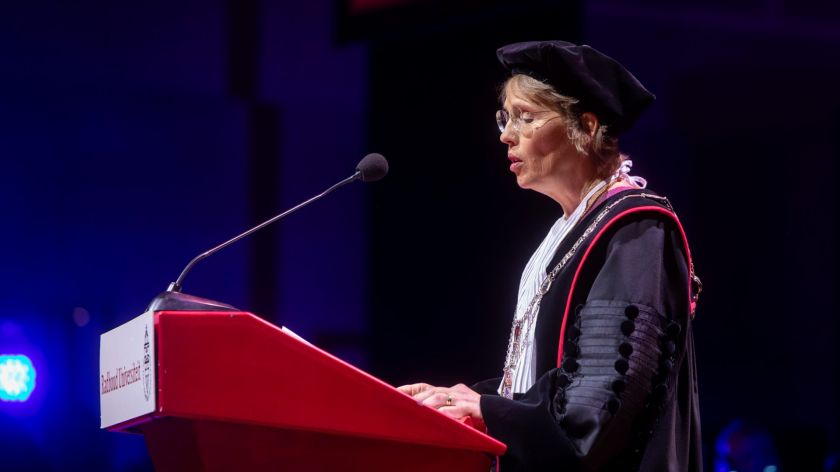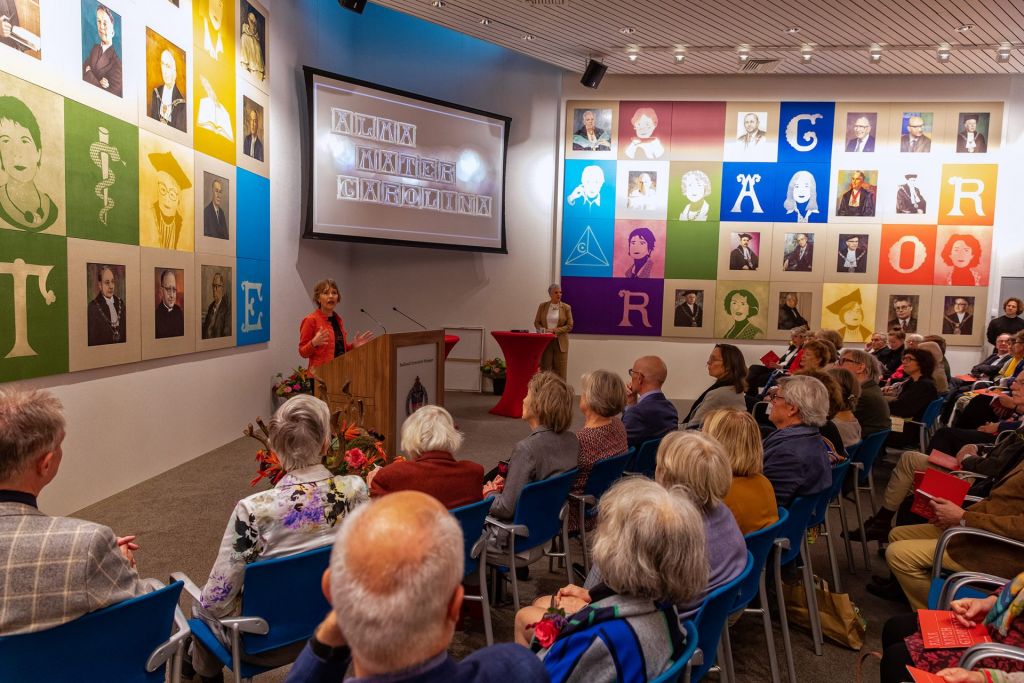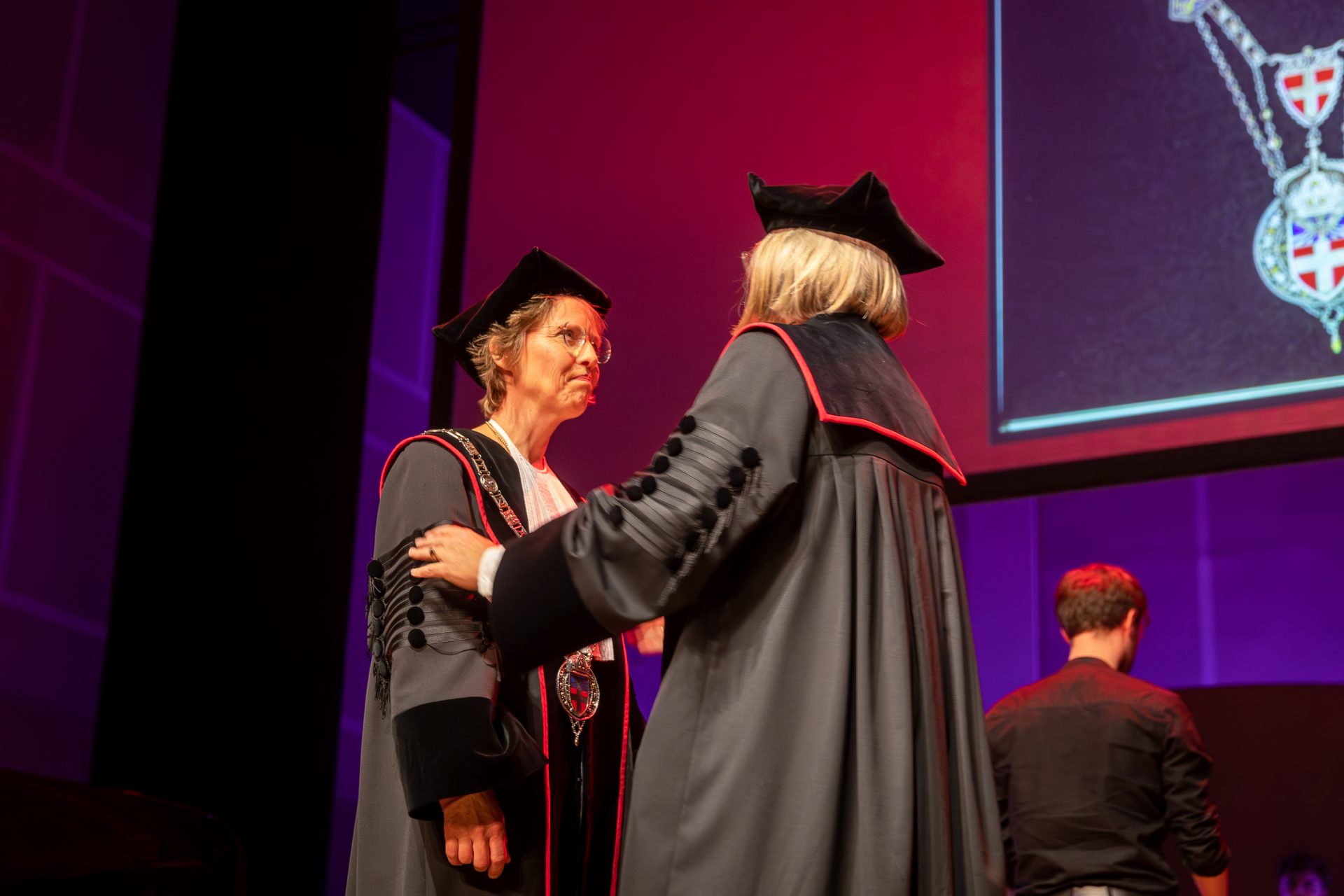First female rector, José Sanders: ‘I am, first and foremost, myself.’
-
 José Sanders as the new rector during the Dies. Photo: Dick van Aalst
José Sanders as the new rector during the Dies. Photo: Dick van Aalst
José Sanders has almost completed her first workweek in her new role. The first female rector of Radboud University shares her motivations and plans in the Senate Chamber, where she opened an artwork on Wednesday that gives a face to female scientists. ‘Bringing together all perspectives will be a challenge.’
One of José Sanders’ initial tasks as the rector magnificus was the opening of the renovated Senate Chamber in the Aula on Wednesday. Previously, the walls were only adorned with the portraits of male rectors, but artist Lara Schnitger has now created a piece that combines those portraits with images of female emeritus professors. The message is clear: Radboud University is more than just a collection of eminent gentlemen of a certain age.
‘For me, the artwork symbolizes a new phase,’ says Sanders as she gazes at the various faces on the wall. ‘Ultimately, it is also a plea for greater diversity in general, not just for more women.’
59 men
The fact is that José Sanders is the first female rector in the hundred-year history of Radboud University. The fact is that 59 men preceded her. The fact is that the academic community will see her as José Sanders, the first woman.
‘I don’t know if my style of leadership is different from that of men.’
‘Yes, I am well aware of that,’ she responds to these facts. ‘But I say: I am not first and foremost a woman; I am first and foremost myself. It is beneficial for the organization if I can be a role model. For other female staff, for students, to show that it is possible. Taking on administrative responsibility is important, and women should be as aware of it as men. But I come from the Faculty of Arts, where there are many women in leadership roles. It’s no longer a rarity.’
She believes that’s how it should be. Gender should ultimately no longer play a role, as long as the genders are balanced. ‘I also don’t know if my leadership style is different from that of men. The diversity in styles among male administrators will be greater than the difference between my style and that of men in general. But I realize that I bring a different experience. I am a mother, for example.’
Sad
When she applied for the position of rector while serving as the dean of the Faculty of Arts and was subsequently presented as the successor to Han van Krieken earlier this year, she could not have foreseen the tumultuous time in which she would begin her task. On Tuesday, she received the rector’s chain, less than a month after De Gelderlander reported that a complaint against her predecessor had been found valid. The complaints committee determined that he had made two comments in January 2017 that could be perceived as sexually intimidating. Van Krieken stepped down prematurely to make way, but that didn’t stop the publications about transgressive behaviour on campus.
‘Did I imagine my assumption of office differently? Well, I couldn’t have imagined it being like this, but once I was nominated as rector, I wholeheartedly embraced it. That means taking things as they come, and I do.’

When she read the news about her predecessor, she immediately understood that she would be under scrutiny as the new rector. ‘I felt sorry for all those involved. But I also thought: soon I’ll be in that position; people will wonder what I will do.’ After reading the article, she made a call to her colleague Van Krieken. They had gotten to know each other better, as he had been guiding her in her new role. And no, she says after a moment of reflection, she doesn’t want to pass judgment on the content of the case. The complaint was dealt with by a complaints committee, and measures were taken. She finds it unproductive to focus on the past. ‘Instead, we should learn from the reactions that the reporting has triggered. We must seize this moment to restore trust where it may have been damaged.’
Division
Opinion pieces from various university staff appeared on Voxweb. Two former deans expressed their outrage at the media for disclosing the news while the concerned colleague in question couldn’t defend themselves. Other staff, on the contrary, felt intimidated by the piece.
‘The division really impacted me,’ says Sanders. ‘The genuine concerns expressed by the two deans, and the genuine anger of the other group of staff. I can empathize with both groups. But you can see that they don’t understand each other, and neither group feels safe. We have work to do to bring those perspectives together.’
‘We’re heading towards new ways of interacting with each other and towards a new era.’
Here, she sees a role for herself by engaging in conversations and finding out where the pain lies. As a newly appointed member of the board, she will do her utmost to regain trust in that top level of governance. Before the end of the year, a university-wide plan of action should be in place to address social insecurity on various fronts, ‘whether it’s about transgressive behaviour or other forms of unwanted conduct. We’ll involve the experts we already have in-house, such as HR personnel, the ombudsperson, and the counsellors. If necessary, we can call on external expertise. There has already been contact with Mariëtte Hamer (government commissioner for transgressive behaviour).’
Sanders talks about ‘a culture change that will take some time.’ We shouldn’t become desperate, she says. ‘I see it more as: come on, we’re heading towards new ways of interacting with each other and towards a new era.’
More diversity
She would like to see new students and staff joining her on this path. In her inaugural address during the Dies celebration, Sanders advocated for ‘a more colourful university’. She meant this quite literally: the campus is too homogenous. Why are there so few students with a migration background? Does everyone feel at home at Radboud University? She wants to investigate whether the university is doing enough to, for example, explain what happens on the campus and the career prospects associated with certain courses at secondary schools.
‘I see this as an important societal role of a university: talent development. But I also feel a responsibility towards science. If we don’t bring in enough diversity, we miss out on certain insights. It’s necessary to bring together people from different backgrounds, languages, and customs.’

Sanders wants to remove hurdles where she finds them., both in- and outside the university. She would like to see more collaboration between faculties, but she knows from her own experience that the existing barriers are often bureaucratic in nature. She wants to do something about it. ‘My job satisfaction lies in enabling others to do their work, so that everyone can fully realize their potential. I like to stand in the middle. It’s a challenging position, but from there, I can lift someone up or push them forward a bit.’
She laughs as she adds, ‘…or give them a nudge.’
Catholic
Her agenda will be partly dull (her words). Because if you want to reduce obstacles, you have to talk, listen, and arrange a lot. All that when she’s located in the Berchmanianum. ‘I miss the students,’ she says with conviction. She worked in the bustling Erasmus Building with great pleasure for the past few years. The monastery was originally built as a quiet place, and it doesn’t quite suit the new rector yet. Laughing, she says, ‘Everything echoes; I’ve already heard that I talk too loudly.’ Her solution is to go out more and get to know the other faculties and departments.
José Sanders is a practicing Catholic. She doesn’t shout it from the rooftops, but she also doesn’t hide it, and this often leads to questions, especially from journalists. Will the university and the Church move closer to each other under her leadership?
‘For me, being Catholic means, first and foremost, having an open view of others.’
‘No, the situation is a given,’ says Sanders firmly. ‘I have no agenda in this, but we will continue to engage in dialogue with each other.’ She sighs a bit in the empty Senate Chamber because her faith has been discussed quite frequently since her appointment. ‘Yes, I am Catholic, just like the university, that’s what we have in common. But for me, being Catholic means, first and foremost, having an open view of others. Seeing others in their personal dignity.’
Her first week as rector is coming to an end. She doesn’t dare to predict how many weeks will follow. ‘As long as it’s granted to me,’ she says thoughtfully. One must remain healthy, ‘and there could be a banana peel right around the corner,’ she says. She means that something can always go wrong; every day could present a reason to stop. She needs to continue to be appreciated and tolerated by the academic community.
‘I have asked a few people I trust to provide me with unsolicited advice. If they think, ‘Sanders, I can’t follow you,’ they should tell me. I need that mirror. And I hope that colleagues can also be honest with me. If you are no longer supported by your organization, you should not insist on staying in your position against all odds. That seems very wrong to me.’
Translated by Siri Joustra



